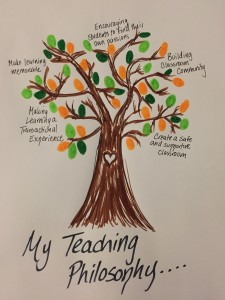Since beginning the Teacher Education Program at UBC and completing my first practicum I have become very passionate in my commitment to several teaching philosophies. I am committed to building a strong classroom community, to making learning a transactional experience, and to encouraging students to discover and explore their own passions. Additionally I am committed to creating a safe and supportive classroom environment in which students can work together to build relationships, make connections, and foster a love of learning. Below is a visual representation of who I aspire to be as a teacher:
Although my experiences at UBC and in my practicum class have both significantly inspired my developing teaching philosophy, the personal journey that my inquiry topic has taken me on thus far has also largely influenced my developing teaching philosophy. Researching and learning about disruptive behaviour in the classroom has opened my eyes to an extremely important and relevant topic in education today. More importantly, learning about disruptive behaviour in the classroom has inspired me to be a better teacher. Thanks to the direction that this inquiry project has taken me, I am beginning to understand that all teachers have the power to positively impact every child, even the seemingly ‘difficult’ ones. Based on the research I have explored so far I believe that by creating a safe, supportive, engaging, and motivating classroom environment not only can I minimize disruptive behaviour, but I can also inspire children to pursue their passions and foster a love of learning.
I am excited to continue my research on disruptive behaviour in the classroom over the next few months, and to further develop the teaching philosophies that will one day define who I am as an educator.

The visual summarizes the key beliefs effectively.
When you talk about “disruptive” behaviour, my question is “what exactly is disruptive behaviour?” and “who does it disrupt”? How can planning help to mitigate this behaviour – for instance, if students are engaged in learning, they are less likely to disrupt the learning of others. It’s how to engage students who lack motivation for school that can be the challenge – this underlines the importance of the environment you believe in creating.